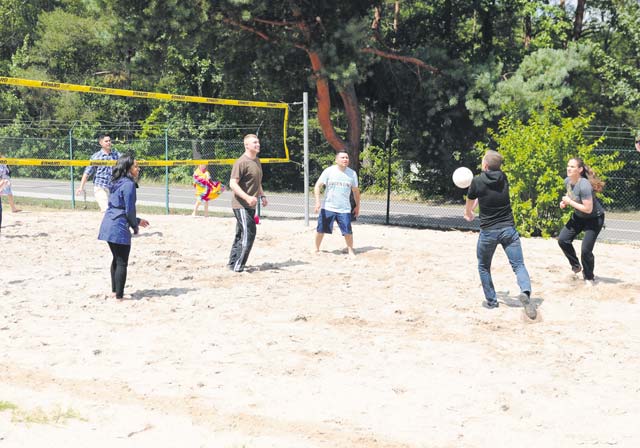
Upon assuming command of the Continental Army in Cambridge, Mass., Gen. George Washington was able to count a total of 15 chaplains already serving within the 23 regiments around Boston. Then, on July 29, 1775, the Continental Congress gave chaplains their first official recognition, marking the birthdate of the Chaplain Corps.
On July 29, exactly 240 years later, unit ministry teams and their families from across the Kaiserslautern area celebrated the anniversary of the Chaplain Corps with food and fellowship on Pulaski Barracks.
“We all have the same mission so it’s wonderful to get everybody together for a little downtime and to reinforce going forward with the mission,” said Col. James Watson, chaplain for Installation Management Command – Europe.
At 240 years old, few other military professions can say they are as old as the Chaplain Corps.
“It’s an honor that our forefathers recognized a need for chaplains that early,” Watson said. “To stand on the glorious legacy that’s gone before is truly an honor, and we look forward to being able to continue that legacy.”
The celebration gave chaplains, religious affairs specialists and their families an opportunity to get to know others in their profession they might not normally work with.
“It’s a great sense of collaboration and cooperation,” said Col. Scott Hammond, command chaplain for the 21st Theater Sustainment Command. “This shows a lot of great unity between the garrison, the hospital and the more traditional division level partnerships.”
For command teams from the battalion level up, chaplains and religious affairs specialists play a vital part in the health and welfare of Soldiers all across the Army.
“(Unit ministry teams are) very important because they provide that means to have a soundboard from a spiritual standpoint that helps to uplift and provide resiliency as well as another outlet to address any concerns or issues,” said Command Sgt. Maj. Anthony F. Williams, senior enlisted leader of the 21st TSC’s Special Troops Battalion. “It’s amazing because for as long as we’ve had an Army, we’ve had the chaplain and they’ve always been there to support us.”
After 240 years, the chaplain profession continues to grow and branch out in order to ensure they represent the growing diversity of beliefs practiced by a melting pot of Soldiers in today’s Army.
“There’s around 130 religious groups we support; so it’s very encompassing,” Hammond said. “There’s quite a variety of groups out there, and we’re here to make sure everybody has a chance to practice their faith and that’s been important to our nation even before we had a nation.”
A vital part of the unit ministry team and acting in a capacity much more than just being a bodyguard or driver, religious affairs specialists, formally known as chaplain’s assistants, are crucial in assisting Army chaplains in accomplishing their mission.
“The most important part of my job is building relationships and rapport with not only our Soldiers, but with our command team as well,” said Sgt. Marcus Levering, a religious affairs specialist with the 5th Military Police Battalion, Criminal Investigation Division.
By accomplishing that task, religious affairs specialists “really prove your value to the organization,” Levering said.
Overall, the members of the chaplaincy are proud of the heritage they come from and strive to ensure their profession remains an important part of how the Army accomplishes its mission.
“For a mature Soldier nearing the end of my career, it gives me great faith to see the young people here carry on the mission,” Watson said. “I know that my nation will be here long after I’m gone with people protecting the constitutional right of free exercise.”


